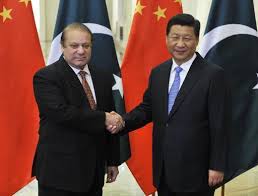
Pakistan announced on Thursday Chinese President Xi Jinping will arrive in Pakistan on April 20 for a two-day visit.
“The Chinese president will attend a joint session of Parliament and important agreements in various fields will be signed during the visit,” Foreign Office spokesperson Tasneem Aslam said, during her weekly press briefing in Islamabad.
Chinese President Xi Jinping will launch energy and infrastructure projects worth $46 billion on a visit to Pakistan next week as China cements links with its old ally and generates opportunities for firms hit by slack growth at home.
Also being finalised is a long-discussed plan to sell Pakistan eight Chinese submarines.
The deal, worth between $4 billion and $5 billion, according to media reports, may be among those signed on the trip.
Commercial and defence ties are drawing together the two countries, which share a remote border and long-standing mistrust of their increasingly powerful neighbour, India, and many Western nations.
“China treats us as a friend, an ally, a partner and above all an equal – not how the Americans and others do,” said Mushahid Hussain Sayed, chairman of the Pakistan Parliament’s defence committee.
Pakistan and China often boast of being “iron brothers” and two-way trade grew to $10 billion last year from $4 billion in 2007, Pakistani data shows.
Xi’s trip is expected to focus on a Pakistan-China Economic Corridor, a planned $46-billion network of roads, railways and energy projects linking Pakistan’s deepwater Gwadar port on the Arabian Sea with China’s far-western Xinjiang region.
It would shorten the route for China’s energy imports, bypassing the Straits of Malacca between Malaysia and Indonesia, a bottleneck at risk of blockade in wartime.
If the submarine deal is signed, China may also offer Pakistan concessions on building a refuelling and mechanical station in Gwadar, a defence analyst said.
China’s own submarines could use the station to extend their range in the Indian Ocean.
“China is thinking in terms of a maritime silk road now, something to connect the Indian Ocean and Pacific Ocean,” said a Pakistani defence official, who declined to be identified.
For Pakistan, the corridor is a cheap way to develop its violence-plagued and poverty-stricken Balochistan, home to Gwadar.
China has promised to invest about $34 billion in energy projects and nearly $12 billion in infrastructure.
Xi is also likely to raise fears that Muslim separatists from Xinjiang are linking up with Pakistani militants, and he could also push for closer efforts for a more stable Afghanistan.
“One of China’s top priorities on this trip will be to discuss Xinjiang,” said a Western diplomat in Beijing.
“China is very worried about the security situation there.”
Reaction to UAE minister
Pakistan refused on Thursday to respond to a statement by a UAE junior foreign minister that censured Pakistan’s neutral stance on the Saudi-led offensive against Houthi rebels in Yemen.
“We do not respond to statements issued on Twitter,” Aslam said.
Read: No fence-sitting: Pakistan ‘ambiguous stance’ angers UAE
On April 11, UAE’s minister of state for foreign affairs Anwar Gargash took to social networking site Twitter to criticise Pakistan’s stance and warned the country of a “heavy price.”
The Pakistani parliament’s resolution, which promoted neutrality on the Yemeni conflict, and voiced support for Saudi Arabia is contradictory and dangerous and unexpected from Islamabad,” the UAE minister had said.
“In favour of its strategic relations with the Gulf nations, contradictory and ambiguous views on this decisive matter will cost highly,” he added.
However, earlier this week Prime Minister Nawaz Sharif clarified the United Arab Emirates foreign minister’s criticism of Pakistan’s neutral stance on Yemen was a result of an “apparent misunderstanding.”
Read: Yemen resolution misinterpreted, Pakistan does not abandon strategic partners: PM
“We are also in touch with other GCC countries to assure them that their disappointment was based on an apparent misinterpretation of Parliament’s Resolution.”
“Pakistan does not abandon friends and strategic partners, especially at a time when their security is under threat,” the premier said, while addressing the nation on April 13.
‘Not involved in an arms race’
Further, reacting to a New York Times editorial asking the world to shift its focus to Pakistan as it grows its nuclear arsenal, Aslam said, “Pakistan is a responsible nuclear nation and we are not involved in any arms race.”

